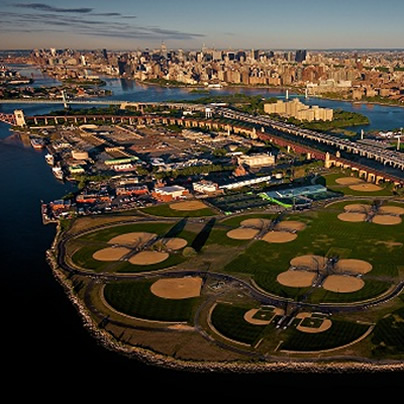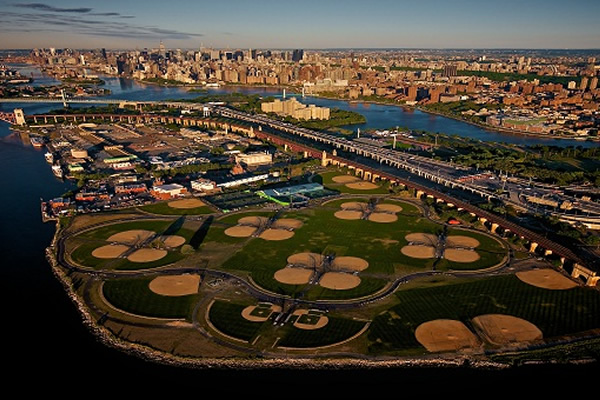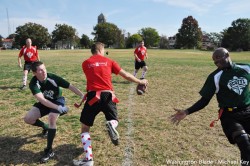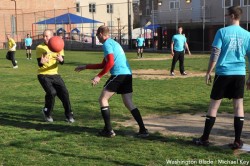Sports
Challenges of organizing local sports leagues
Permit process, lack of fields often vex D.C. players


New York City created a 273-acre local sports and recreational playground floating on the East River. Could D.C. find similar space for its local amateur athletes? (Photo courtesy of the Randall’s Island Park Alliance)
D.C. is home to one of the largest and most organized LGBT sports communities in the world. The list of LGBT local sports teams has grown to more than 30 clubs and the athlete base is well over 3,000 members.
Those kinds of numbers would not be possible without the leadership that is demonstrated by members of each of the clubs.
But the success of local organizers doesn’t mean they don’t encounter obstacles to growth. Some of the challenges facing them include lack of playing space, high costs for space, accessibility and the local permit process.
FIND MORE OF THE WASHINGTON BLADE SPORTS ISSUE HERE.
The permit process, especially for a new team forming, can cause major frustration for those not familiar with the process. There are cross-jurisdictional issues and some of the entities that may present a challenge are the National Park Service, the D.C. Department of Parks and Recreation, the Department of General Services Realty Office as well as the facility or school that the space sits on.
One person who knows the permit process well is Alex Bearman, executive director of District Sports who manages leagues and playing space for 240 primarily straight soccer teams at 15 different locations in the area.
District Sports primarily uses playing fields that are run by schools, which means that their process includes being approved by the athletic director, the vice principal or the principal. “There is a lot of hand-holding, showing up and talking,” says Bearman. “You can make it through the permit process and then be turned down by the facility because there are just not enough incentives for the facility to offer their space. There is also the added cost of paying for a maintenance man to be on site.”
Nick Napolitano leads the permit process for the Federal Triangles Soccer Club and agrees that the schools do not have enough incentives to risk having their fields torn up by an adult sports league.
“You really have to establish a relationship with the school principal and prove that you will respect the condition of their field,” says Napolitano. “In the past we have had to enlist the help of D.C. Council member Jim Graham just to get our foot in the door. Even when you get to that point, it is still hard to budget for the fees as they can fluctuate.”
When the DC Gay Flag Football League (DCGFFL) began, it targeted the fields near the FDR Memorial as their home base and came up with no results during the permit process.
“We ended up going through our roster of players just to find someone who knew someone or at least knew the process,” says JJ Johnson, league commissioner. “Even after securing the spot, we were still confronted by a park ranger on the first day.”

D.C. Gay Flag Football plays at Carter Barron Fields. (Washington Blade photo by Michael Key)
The DCGFFL outgrew that field almost immediately and is now ensconced at the Carter Barron Fields on Sundays. The group considers themselves lucky to have access to such a large amount of space as they have grown to 276 players.
Carter Barron is federally owned, administered by the National Park Service, and permitted by the DC Department of Parks and Recreation.
“It was very confusing at first,” says Johnson. “We now show up at the permit office several times a year just to shake hands and chit chat. We want them to know who we are and that we are appreciative.”
Martin Espinoza of Stonewall Kickball agrees that the permit process can be stressful as the kickball league faces two permit renewals each year. They generally have their calendar set up for the upcoming season without knowing if their permit will be renewed. To be safe, league registration is always scheduled after the permit approval date.
Currently, the kickball league plays on Sundays at Stead Park Field. When the club started in 2010, the city was not allowing use of Stead Park on Sundays. “We were very fortunate,” admits Espinoza. “The city made an exception to allow us to play on Sundays.”

A gay kickball league is among the groups that make use of Stead Park. (Washington Blade photo by Michael Key)
Stonewall Kickball has seen incredible growth since its inception with a current member list of 550 players. Because they were unable to secure a permit for an additional night, they have spilled over into the predominately straight DC Kickball League, which holds the permit for Thursday nights at Stead Park Field.
“We are hoping to grow this season by securing additional time on Sundays,” says Espinoza. “Even though we arrive at the permit office with all of our paperwork on the first day of renewal, it is still a waiting game. Youth, senior and city programs are looked at first. Adult sports come last.”
Stonewall Kickball will face another obstacle in 2014 when the $1.6 million renovation of Stead Park Field will begin. It is unclear at this time whether they will have a place to play or not.
In March of 2013, a new LGBT sports team joined the fray in the struggle for playing space. The Washington Scandals Rugby Club has not yet found a field to call home. Being new to the process, they are running into the same obstacles that seem to plague all new sports teams.
“We have been looking for space on weeknights in the District and there is nothing available for adult sports groups,” says Arc Riley of the Scandals. “The field we are practicing on is so small that half of our 40 players are standing on the sidelines while the other half practice.”
The struggle with getting a response from the Department of Parks and Recreation has led the Scandals to start looking for space in Montgomery County for the winter months. “We are hoping to be back in the District by spring,” says a hopeful Riley.
Faced with a similar space shortage back in the 1990s, New York City, along with the Randall’s Island Park Alliance (RIPA) created a 273-acre sports and recreational playground floating on the East River.
Randall’s Island boasts more than 60 sports fields, accommodating sports such as soccer, baseball, softball, lacrosse, field hockey and rugby. Also included on the island is a world-class track stadium, a tennis center, golf facilities as well as cultural and natural areas.
Formerly used over the centuries for a range of public facilities including a boy’s home, a hospital, and a home for Civil War veterans, the island was first designated as a park in 1936 by Franklin Delano Roosevelt. By the early 1990s it was in serious disrepair.
RIPA was formed in 1992 as a 501c3 non-profit organization to work with New York and local communities to transform the island. Today, Randall’s Island is New York’s premier recreational destination and home to dozens of sports leagues for youth, adult, senior and the LGBT sports communities.
The bottom line in the D.C. area is that although the permit process can be tedious, the lack of playing space is the primary obstacle in accommodating the ever-growing sports community. The overwhelming success of the Long Bridge Park sports complex in Arlington in November 2011 is a perfect example of the need for more sports space in the area.
The possibility of 190 acres opening up in the future at Metro accessible RFK Stadium is giving many in the sports community dreams of a dedicated sports complex in Prince George’s County.
RFK Sports Park anyone?
Sports
US wins Olympic gold medal in women’s hockey
Team captain Hilary Knight proposed to girlfriend on Wednesday

The U.S. women’s hockey team on Thursday won a gold medal at the Milan Cortina Winter Olympics.
Team USA defeated Canada 2-1 in overtime. The game took place a day after Team USA captain Hilary Knight proposed to her girlfriend, Brittany Bowe, an Olympic speed skater.
Cayla Barnes and Alex Carpenter — Knight’s teammates — are also LGBTQ. They are among the more than 40 openly LGBTQ athletes who are competing in the games.
The Olympics will end on Sunday.
Sports
Attitude! French ice dancers nail ‘Vogue’ routine
Cizeron and Fournier Beaudry strike a pose in memorable Olympics performance

Madonna’s presence is being felt at the Olympic Games in Italy.
Guillaume Cizeron and his rhythm ice dancing partner Laurence Fournier Beaudry of France performed a flawless skate to Madonna’s “Vogue” and “Rescue Me” on Monday.
The duo scored an impressive 90.18 for their effort, the best score of the night.
“We’ve been working hard the whole season to get over 90, so it was nice to see the score on the screen,” Fournier Beaudry told Olympics.com. “But first of all, just coming out off the ice, we were very happy about what we delivered and the pleasure we had out there. With the energy of the crowd, it was really amazing.”
Watch the routine on YouTube here.
Italy
Olympics Pride House ‘really important for the community’
Italy lags behind other European countries in terms of LGBTQ rights

The four Italian advocacy groups behind the Milan Cortina Winter Olympics’ Pride House hope to use the games to highlight the lack of LGBTQ rights in their country.
Arcigay, CIG Arcigay Milano, Milano Pride, and Pride Sport Milano organized the Pride House that is located in Milan’s MEET Digital Culture Center. The Washington Blade on Feb. 5 interviewed Pride House Project Manager Joseph Naklé.
Naklé in 2020 founded Peacox Basket Milano, Italy’s only LGBTQ basketball team. He also carried the Olympic torch through Milan shortly before he spoke with the Blade. (“Heated Rivalry” stars Hudson Williams and Connor Storrie last month participated in the torch relay in Feltre, a town in Italy’s Veneto region.)
Naklé said the promotion of LGBTQ rights in Italy is “actually our main objective.”
ILGA-Europe in its Rainbow Map 2025 notes same-sex couples lack full marriage rights in Italy, and the country’s hate crimes law does not include sexual orientation or gender identity. Italy does ban discrimination based on sexual orientation in employment, but the country’s nondiscrimination laws do not include gender identity.
ILGA-Europe has made the following recommendations “in order to improve the legal and policy situation of LGBTI people in Italy.”
• Marriage equality for same-sex couples
• Depathologization of trans identities
• Automatic co-parent recognition available for all couples
“We are not really known to be the most openly LGBT-friendly country,” Naklé told the Blade. “That’s why it (Pride House) was really important for the community.”
“We want to use the Olympic games — because there is a big media attention — and we want to use this media attention to raise the voice,” he added.

Naklé noted Pride House will host “talks and roundtables every night” during the games that will focus on a variety of topics that include transgender and nonbinary people in sports and AI. Another will focus on what Naklé described to the Blade as “the importance of political movements now to fight for our rights, especially in places such as Italy or the U.S. where we are going backwards, and not forwards.”
Seven LGBTQ Olympians — Italian swimmer Alex Di Giorgio, Canadian ice dancers Paul Poirier and Kaitlyn Weaver, Canadian figure skater Eric Radford, Spanish figure skater Javier Raya, Scottish ice dancer Lewis Gibson, and Irish field hockey and cricket player Nikki Symmons — are scheduled to participate in Pride House’s Out and Proud event on Feb. 14.
Pride House Los Angeles – West Hollywood representatives are expected to speak at Pride House on Feb. 21.
The event will include a screening of Mariano Furlani’s documentary about Pride House and LGBTQ inclusion in sports. The MiX International LGBTQ+ Film and Queer Culture Festival will screen later this year in Milan. Pride House Los Angeles – West Hollywood is also planning to show the film during the 2028 Summer Olympics.
Naklé also noted Pride House has launched an initiative that allows LGBTQ sports teams to partner with teams whose members are either migrants from African and Islamic countries or people with disabilities.
“The objective is to show that sports is the bridge between these communities,” he said.
Bisexual US skier wins gold
Naklé spoke with the Blade a day before the games opened. The Milan Cortina Winter Olympics will close on Feb. 22.
More than 40 openly LGBTQ athletes are competing in the games.
Breezy Johnson, an American alpine skier who identifies as bisexual, on Sunday won a gold medal in the women’s downhill. Amber Glenn, who identifies as bisexual and pansexual, on the same day helped the U.S. win a gold medal in team figure skating.
Glenn said she received threats on social media after she told reporters during a pre-Olympics press conference that LGBTQ Americans are having a “hard time” with the Trump-Vance administration in the White House. The Associated Press notes Glenn wore a Pride pin on her jacket during Sunday’s medal ceremony.
“I was disappointed because I’ve never had so many people wish me harm before, just for being me and speaking about being decent — human rights and decency,” said Glenn, according to the AP. “So that was really disappointing, and I do think it kind of lowered that excitement for this.”


















